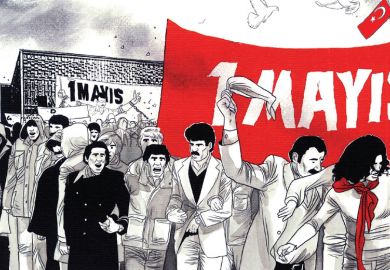In Steven Spielberg’s 1981 film Raiders of the Lost Ark, the heroic archaeologist Indiana Jones rescues the Ark of the Covenant from a devilish Nazi plot.
In her newly translated book Tunnels, the award-winning Israeli graphic novelist Rutu Modan uses a similar story about archaeologists looking for the Ark – the ancient Israelites’ most sacred relic, last seen about six centuries before Christ – to offer a satire on academic life and how it gets politicised in the Middle East.
Now associate professor of illustration and comics at the Bezalel Academy of Arts and Design in Jerusalem, she is herself the daughter of two academics.
For her parents, their whole life, Ms Modan told Times Higher Education, was “around research, even more than around the family. They were working in the same field of epidemiology, always bringing work home, fighting about research methods or whose name was to be first on an article. But they also fought like regular couples, about all the other things. They eventually separated their areas of research in order to fight less.”
Tunnels vividly captures such academic obsessiveness, fractiousness and sometimes ruthlessness through the story of Nili and Nimrod, the quarrelsome children of star archaeologist Israel Broshi, and his protégé Rafi Sarid, who has betrayed him by whispering to a tenure committee that he is beginning to go senile. Yet professional and sibling rivalries prove to be only the tip of the iceberg. When Nili sets out into the desert, she is soon confronted by the West Bank separation barrier and Palestinian claims to the tunnel where she wants to dig. She is also forced to use the services of a religious settler who claims that “whatever you find might prove the link between the People of Israel and the Land of Israel. Jews will be able to settle there.” A very ugly and intractable form of politics is simply unavoidable.
One of the countless bones of contention between Jewish Israelis and Palestinians, Ms Modan pointed out, “is more or less ‘Who was here first?’ – a bit like a fight in kindergarten about who got the chair.” Both sides, not to mention Christians eager to find literal proof of the Bible, have often turned to archaeology to make their case.
For Jewish Israelis, Ms Modan went on, “archaeology is very much connected to Zionism and politics. It was a very prestigious profession in the 1940s and 1950s. Whenever there’s some discovery, there’s immediately a fight between the left and right, the conservative and progressive, those in favour of peace and those in favour of settlements.”
Yet it was one of the paradoxes about archaeology in Israel, as Ms Modan points out in an afterword to Tunnels, that the findings themselves have tended to be pretty unimpressive: “Broken tools, barren stone walls, bone mounds. Here and there, a coin or a minuscule clay bulla [is] unearthed and their discovery makes front-page news."
Here Ms Modan recalled the words of her mother, “a very devoted scientist who also had a good sense of humour and used to say, ‘Statistics is a science where you torture the numbers until they confess.’” Whether or not this is true in medical research, it is very easy for archaeologists to interpret their findings in the light of their prior political or religious preconceptions, particularly when they have turned up little more than olive pips or “something which used to be a wall”.
If Israeli archaeologists are looking for the remains of animals on an ancient site, suggested Ms Modan, “and don’t find any pig bones, they conclude there must have been Jews there. It’s all about stories and interpretation rather than just the findings…I don’t understand why it matters so much. If we find stones with a date which show that Jews were living in Bethlehem 3,000 years ago and Joshua is standing next to me as a real person, does that mean that we are allowed to do what we are doing [to the Palestinians]? If people used to live here 3,000 years ago and they didn’t eat pig, does that mean I now have the right to live in Bethlehem?”
As an author, Ms Modan stressed that her main aim was for Tunnels “to be entertaining and for the reader to have a good time”. But although it certainly contains its share of comic encounters, explosions, perilous escapes and shady dealers in antiquities, it also poses some challenging questions about the complex politics of archaeology.
POSTSCRIPT:
Print headline: In Israel, digs bring politics, Zionism and prosaic finds
Register to continue
Why register?
- Registration is free and only takes a moment
- Once registered, you can read 3 articles a month
- Sign up for our newsletter
Subscribe
Or subscribe for unlimited access to:
- Unlimited access to news, views, insights & reviews
- Digital editions
- Digital access to THE’s university and college rankings analysis
Already registered or a current subscriber?





